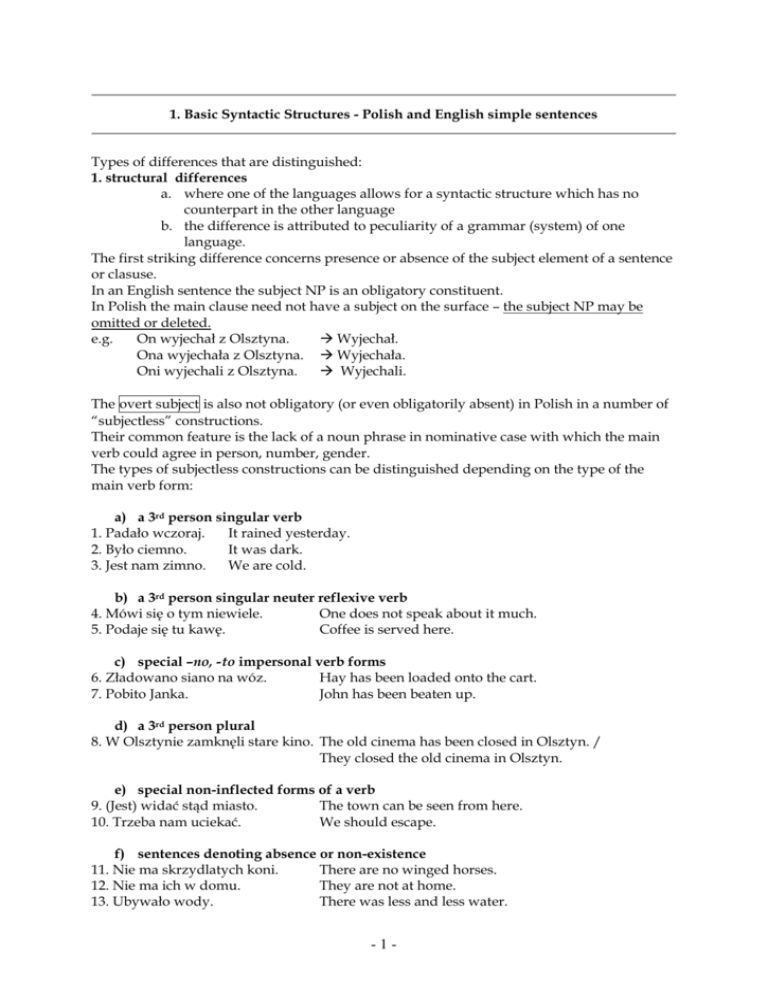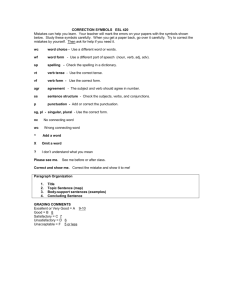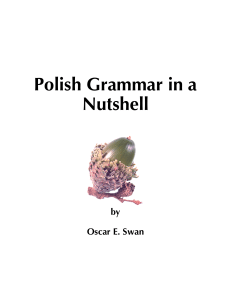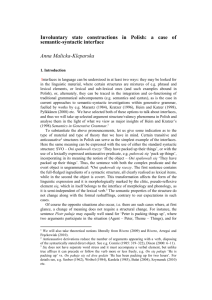Basic Syntactic Structures I - Polish and English simple sentences
advertisement

1. Basic Syntactic Structures - Polish and English simple sentences Types of differences that are distinguished: 1. structural differences a. where one of the languages allows for a syntactic structure which has no counterpart in the other language b. the difference is attributed to peculiarity of a grammar (system) of one language. The first striking difference concerns presence or absence of the subject element of a sentence or clasuse. In an English sentence the subject NP is an obligatory constituent. In Polish the main clause need not have a subject on the surface – the subject NP may be omitted or deleted. e.g. On wyjechał z Olsztyna. Wyjechał. Ona wyjechała z Olsztyna. Wyjechała. Oni wyjechali z Olsztyna. Wyjechali. The overt subject is also not obligatory (or even obligatorily absent) in Polish in a number of “subjectless” constructions. Their common feature is the lack of a noun phrase in nominative case with which the main verb could agree in person, number, gender. The types of subjectless constructions can be distinguished depending on the type of the main verb form: a) a 3rd person singular verb 1. Padało wczoraj. It rained yesterday. 2. Było ciemno. It was dark. 3. Jest nam zimno. We are cold. b) a 3rd person singular neuter reflexive verb 4. Mówi się o tym niewiele. One does not speak about it much. 5. Podaje się tu kawę. Coffee is served here. c) special –no, -to impersonal verb forms 6. Zładowano siano na wóz. Hay has been loaded onto the cart. 7. Pobito Janka. John has been beaten up. d) a 3rd person plural 8. W Olsztynie zamknęli stare kino. The old cinema has been closed in Olsztyn. / They closed the old cinema in Olsztyn. e) special non-inflected forms of a verb 9. (Jest) widać stąd miasto. The town can be seen from here. 10. Trzeba nam uciekać. We should escape. f) sentences denoting absence or non-existence 11. Nie ma skrzydlatych koni. There are no winged horses. 12. Nie ma ich w domu. They are not at home. 13. Ubywało wody. There was less and less water. -1- 14. Brakowało (im) pożywiena. There was not enough food. / They lacked food. These sentences in (f) are different than those in (a-e) because the case form is different from nominative, and their number, person and gender features have no influence on the shape of the verb. The subjectless constructions 1-14 were grouped depending on the syntactic features. But they can also be divided depending on another factor: whether the real-life performer of the action expressed by the verb can or cannot be recovered. In (b, c, and d) there is an unspecified performer of the action described by the verb. The performer is not overtly the subject, but his existence is implied. The subject could be expressed by ktoś, ktokolwiek. Such sentences usually have passive equivalents in English, with the Subject NP unexpressed (deleted). Other possible translations: One… (4) they e.g. Kradną tu samochody – They steal cars here. The subject of an English sentence corresponds to the object NP in the Polish equivalent (3, 10) There is no implied subject (i.e. it is impossible to recover the deleted agent/performer of the action) as in the examples below. They are usually translated with it. or Existential there (11, 12, 13, 14) 15. Dniało. 16. Zmierzachło (się). 17. Ściemniło się. 18. Było słonecznie. 19. Było nam przyjemnie. 20. Jest nam wygodnie. A. Mickiewicz, Pan Tadeusz -2-











